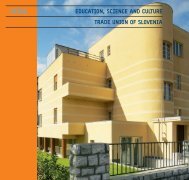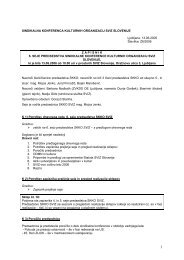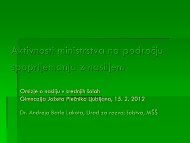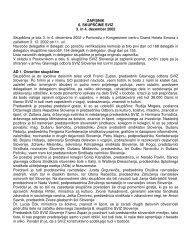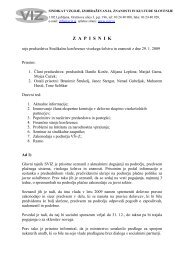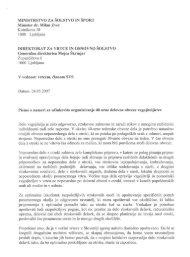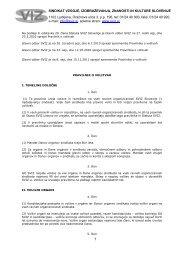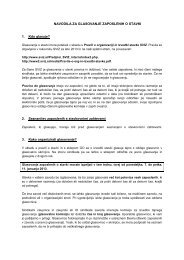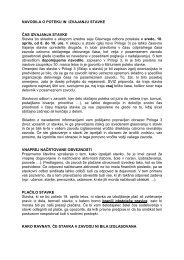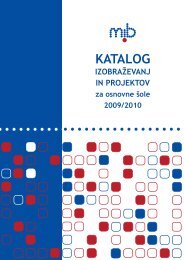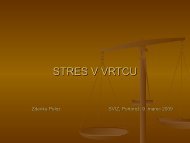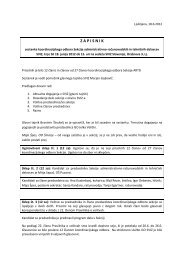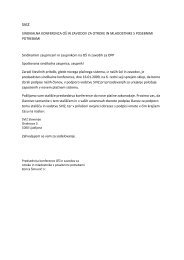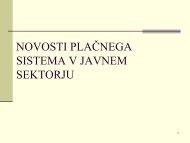The use and misuse of teacher appraisal - Education International
The use and misuse of teacher appraisal - Education International
The use and misuse of teacher appraisal - Education International
Create successful ePaper yourself
Turn your PDF publications into a flip-book with our unique Google optimized e-Paper software.
T H E U S E A N D M I S U S E O F T E A C H E R A P P R A I S A L<br />
<br />
CANADA<br />
In Canada, the regulations for <strong>appraisal</strong> vary between jurisdictions. <strong>The</strong> CTF <strong>and</strong> EFTO<br />
provide the following broad picture:<br />
In general, approaches to <strong>teacher</strong> <strong>appraisal</strong> consist <strong>of</strong> completion <strong>of</strong> probation, <strong>teacher</strong><br />
registration or certification, <strong>and</strong> performance management. In Canada, this involves<br />
requirements for specified improvement goals <strong>and</strong> assistance at meeting those goals.<br />
Permanent <strong>teacher</strong>s, <strong>teacher</strong>s on fixed-term contracts, <strong>and</strong> those on probation<br />
undergo <strong>appraisal</strong>. This is m<strong>and</strong>atory every one to five years, before decisions on<br />
employment status (e.g. promotion, conversion or awarding <strong>of</strong> a permanent contract),<br />
or as a focus on <strong>teacher</strong>s new to the pr<strong>of</strong>ession. <strong>The</strong>re is also voluntary evaluation in<br />
Canada. However, requirements vary between jurisdictions, <strong>and</strong> a number <strong>of</strong> jurisdictions<br />
<strong>use</strong> a growth model in which <strong>appraisal</strong> is not m<strong>and</strong>atory.<br />
Appraisal is devised by central as well as by local authorities, <strong>teacher</strong>s (<strong>and</strong> <strong>teacher</strong><br />
unions) <strong>and</strong> school leaders. Pr<strong>of</strong>essional st<strong>and</strong>ards are set <strong>and</strong> appraised by pr<strong>of</strong>essionals<br />
who have received specific training. Teachers are appraised against school development<br />
plans <strong>and</strong> their own pr<strong>of</strong>essional goals. Specifically, <strong>teacher</strong>s are evaluated on aspects<br />
linked to their planning <strong>and</strong> preparation, instruction, <strong>and</strong> classroom environment. <strong>The</strong><br />
instruments <strong>use</strong>d involve classroom observation, objective setting <strong>and</strong> interview/dialogue<br />
with the <strong>teacher</strong>, <strong>teacher</strong> self-<strong>appraisal</strong>, <strong>and</strong> portfolio. Parent surveys exist for broader<br />
purposes, but the CTF <strong>and</strong> the EFTO emphasise that <strong>appraisal</strong> is not reduced to a popularity<br />
contest.<br />
Appraisal can lead to the provision <strong>of</strong> further pr<strong>of</strong>essional development activities for<br />
<strong>teacher</strong>s identified as ‘underperforming’, involving extra opportunities for in-service<br />
pr<strong>of</strong>essional development as well as changes in responsibilities. Appraisal also influences<br />
the speed at which <strong>teacher</strong>s’ careers progress.<br />
Broadly speaking, the school climate in Canada is such that <strong>teacher</strong>s are encouraged<br />
to help each other. Appraisal is not a competitive activity, but rather a measurement<br />
<strong>of</strong> acceptability against pre-determined st<strong>and</strong>ards <strong>of</strong> practice. This ensures that staff<br />
work together to secure the best performance for all students. Schools are not<br />
interested in ranking <strong>teacher</strong>s, but in having a generally high quality <strong>of</strong> teaching. Indeed,<br />
student learning becomes the responsibility <strong>of</strong> all pr<strong>of</strong>essionals, <strong>and</strong> the overall target<br />
is for the maximum improvement <strong>of</strong> all students. <strong>The</strong> process rests on several<br />
assumptions: a) no one <strong>teacher</strong> is best for all students; b) every student can be<br />
helped by some teaching practices, <strong>and</strong> c) popularity does not equal good teaching.<br />
15



